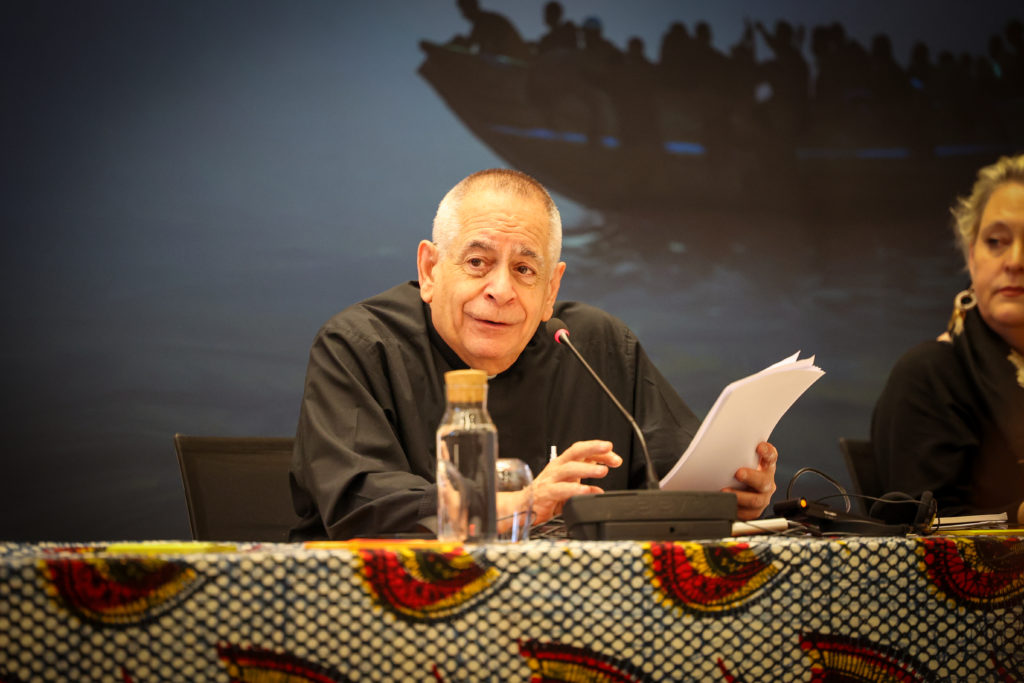Actions of Faith-inspired organizations to Advance Health and HIV Care for Migrants, Refugees, and Displaced Populations
From 12 to 14 March 2024, the International Catholic Migration Commission (ICMC) hosted a workshop titled “Faith Sector’s Engagement with Migrants, Refugees for Health and HIV Care” at the World Council of Churches (WCC) in Geneva, Switzerland. The gathering brought together 75 participants from over 20 countries spanning five continents. It included members of organizations based on Roman Catholic, Orthodox, and Muslim traditions, as well as representatives of ecumenical and interfaith organizations. Representatives of various UN agencies, including the Joint United Nations Programme on HIV/AIDS (UNAIDS), the U.S. President’s Emergency Plan for AIDS Relief (PEPFAR), the UN Refugee Agency (UNHCR), and the International Organization for Migration (IOM) also attended the event.

The workshop aimed to tackle pressing issues surrounding access to healthcare for migrants and refugees, combat the stigma associated with HIV, preserve the dignity of those in need, and explore the pivotal role that faith-based organizations can play in addressing these challenges. Strategic discussions and collaborations were explored throughout the event, paving the way for tangible outcomes and actionable recommendations.
“Increased forced displacement in recent years put people in hazardous conditions. When they arrive, they are often received with injustice and fear. As Christians, our responsibility is to support people on the move. As Christians, ‘we are no longer strangers,’ noted Reverend Doctor Kenneth Mtata, Director of Public Witness and Diakonia for WCC, during his opening remarks.
Day 1 of the workshop laid the foundation for understanding the global health and HIV challenges faced by migrants, refugees, and displaced populations. Participants identified critical policy gaps and opportunities for enhancing access to healthcare services in crisis settings. Moreover, the essential role of faith-based organizations in addressing health and HIV needs, particularly in such contexts, was underscored through the models and lessons learned of successful initiatives and programs presented by participants. “Faith-based organizations are often the only resort to meet displaced people with HIV.” said Christine Stegling, Deputy Executive Director of the Policy, Advocacy, and Knowledge Branch for UNAIDS. “They have the networks and are often the first to intervene in crisis and, often, the only ones to stay when the UN leaves.”

Building upon this groundwork, the participants delved into holistic care approaches and innovative HIV testing mechanisms tailored to migrants and refugees. Successful partnerships between faith-based organizations and other stakeholders were highlighted, emphasizing the importance of collaboration to improve access to healthcare. “A church is a social network, and we can use those connection to reach more people,” noted Dr. Busi Msimang, Technical Officer for HIV Testing Services at the World Health Organization, citing the positive impact faith communities have in preventing the spread of diseases. The discussions also explored strategies for addressing sexual and gender-based violence in humanitarian settings and promoting gender equality within faith-based organizations. “We need to change the gender norms. That’s the only way to address gender-based violence. This needs long-term investments,” remarked Emilie Page, Senior GBV Officer for the UN Refugee Agency (UNHCR).
On the final day, participants focused on strategies to prevent and eliminate stigma and discrimination in HIV/health care provision for migrants and refugees. A comprehensive Call to Action document outlining joint initiatives and advocacy plans was developed, which included a reflection on the implementation and monitoring mechanisms for sustaining collaborative efforts beyond the workshop.
The workshop provided invaluable insights into global trends of migration and health, best practices to enhance access to health services, and strategies to address sexual and gender-based violence and stigma. Among the points that participants shared as steps to be taken to move forward, they agreed on greater inclusion of faith-based organizations at the global and local level, on the development of consensus-building and in anticipation of potential future humanitarian crises.
The exchange of ideas and experiences paved the way for concrete actions to improve the health and well-being of migrants, refugees, and displaced populations. The consolidated feedback from participants will lead to an action plan, which will be presented in Munich in July 2024, during the upcoming 25th International AIDS Conference.



